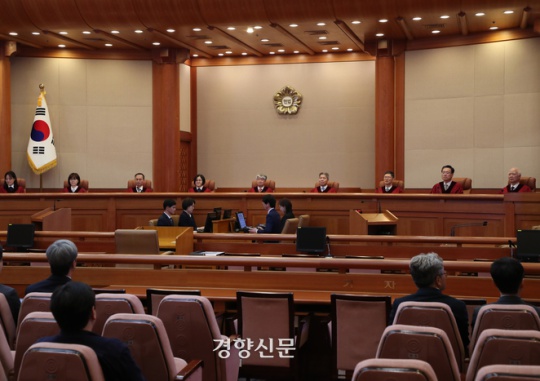Court rules unconditional inheritance of property to family members is unconstitutional
이 글자크기로 변경됩니다.
(예시) 가장 빠른 뉴스가 있고 다양한 정보, 쌍방향 소통이 숨쉬는 다음뉴스를 만나보세요. 다음뉴스는 국내외 주요이슈와 실시간 속보, 문화생활 및 다양한 분야의 뉴스를 입체적으로 전달하고 있습니다.

The Constitutional Court ruled that the legal reserve of inheritance system, which forces siblings, children, spouses, and parents to inherit more than a certain percentage of their estate regardless of the deceased's wishes, was unconstitutional. It was considered unconstitutional that the system of unconditionally inheriting property even to family members who committed immoral or abusive behaviors to the deceased. The Constitutional Court's decision on the unconstitutionality of the system came 47 years after it was introduced in 1977.
The Constitutional Court unanimously ruled that Article 1112(4) of the Civil Code, which stipulates the percentage of the legal reserve of inheritance for siblings, was unconstitutional. The article stipulates that the siblings of the deceased have the right to receive one-third of the legal inheritance as legal reserve. According to the recent Constitutional Court's decision, the provision will cease to be effective immediately.
"The siblings of the deceased are rarely recognized for their contribution to the formation of the inheritance or their expectation of the inheritance. Therefore, there is no justification for granting them the right of inheritance," The Constitutional Court said.
The Court unanimously ruled that Article 1112, paragraphs 1, 2, and 3 of the Civil Code, which stipulates the proportion of the legal reserve of inheritance to children, spouses, and parents, was unconstitutional. The article stipulates that direct descendants and spouses of the deceased receive one-half of the legal inheritance, while direct ascendants receive one-third.
The Constitutional Court held that the inheritance system itself is justified in that it protects the right of the bereaved to survive. However, it said the law should stipulate the reasons why the children, spouse, and parents of the deceased can lose their share. It said, “It is contrary to the legal sentiment and common sense of the public to recognize the legal reserve of heirs who committed immoral acts, such as long-term abandonment or mental and physical abuse, to a decedent." It added, "It is unreasonable that Article 1112 of the Civil Code does not separately stipulate the reasons for the loss of legal reserve.” The National Assembly has to revise the article by December 31 next year. Until then, it will continue to be effective.
Controversy has long been raised over the constitutionality of the system. When singer Goo Hara died in 2019, her mother, who had been out of contact for more than 20 years, claimed her right to the inheritance, creating controversy over the system.
"This is the first decision to comprehensively examine and rule on the legitimacy of the legislative purpose of the inheritance system itself, as well as the constitutionality of each article," the Constitutional Court said. It is meaningful that the court declared unconstitutionality of the articles and called for legislative improvements while continuing to recognize the constitutional legitimacy of the system.”
※This article has undergone review by a professional translator after being translated by an AI translation tool.
Copyright © 경향신문. 무단전재 및 재배포 금지.
- 일본 목욕탕서 700장 이상 불법도촬한 외교관···조사 없이 ‘무사귀국’
- 서울 다세대주택서 20대 남성과 실종 신고된 10대 여성 숨진 채 발견돼
- 안현모, 이혼 후 한국 떠나려고···“두려움 있었다” (전참시)
- 아이가 실수로 깨트린 2000만원 도자기, 쿨하게 넘어간 중국 박물관
- 인감증명서 도입 110년 만에…9월30일부터 일부 온라인 발급 가능해져
- “하이브·민희진 분쟁은 멀티레이블 성장통” “K팝의 문제들 공론화”
- ‘유시민 누나’ 유시춘 EBS 이사장 사무실 압수수색
- 김신영 날린 ‘전국노래자랑’ 한달 성적은…남희석의 마이크가 무겁다
- 국가주석에 국회의장까지 권력 빅4 중 2명 숙청···격랑의 베트남 정치
- 수능 6등급도 교대 합격···상위권 문과생들 “교사 안 할래요”